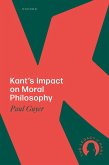Throughout his writings, and particularly in
Religion within the Boundaries of Mere Reason,
Kant alludes to the idea that evil is connected to self-deceit, and while numerous commentators regard this as a highly attractive thesis, none have seriously explored it. Laura Papish's
Kant on Evil, Self-Deception, and Moral Reform addresses this crucial element of Kant's ethical theory. Working with both Kant's core texts on ethics and materials less often cited within scholarship on Kant's practical philosophy (such as Kant's logic lectures), Papish explores the cognitive dimensions of Kant's accounts of evil and moral reform while engaging the most influential -- and often scathing -- of Kant's critics. Her book asks what self-deception is for Kant, why and how it is connected to evil, and how we achieve the self-knowledge that should take the place of self-deceit. She offers novel defenses of Kant's widely dismissed claims that evil is motivated by self-love and that an evil is rooted universally in human nature, and she develops original arguments concerning how social institutions and interpersonal relationships facilitate, for Kant, the self-knowledge that is essential to moral reform. In developing and defending Kant's understanding of evil, moral reform, and their cognitive underpinnings, Papish not only makes an important contribution to Kant scholarship.
Kant on Evil, Self-Deception, and Moral Reform also reveals how much contemporary moral philosophers, philosophers of religion, and general readers interested in the phenomenon of evil stand to gain by taking seriously Kant's views.
Dieser Download kann aus rechtlichen Gründen nur mit Rechnungsadresse in A, B, BG, CY, CZ, D, DK, EW, E, FIN, F, GR, HR, H, IRL, I, LT, L, LR, M, NL, PL, P, R, S, SLO, SK ausgeliefert werden.
Hinweis: Dieser Artikel kann nur an eine deutsche Lieferadresse ausgeliefert werden.









